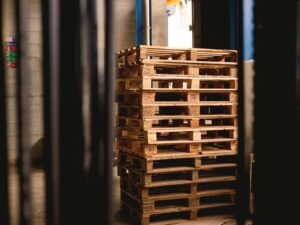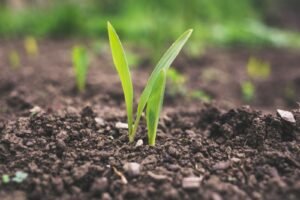Investing in Agri-Food Tech: Building Resilient Food Systems
As the world begins to pick back up the pieces after Covid-19, investor mindsets are changing & the global business landscape is accelerating digital transformation and unlocking opportunities for innovators offering solutions to new challenges we now face in the food supply chain. One bright spot has been the increase in agri-tech investment due to the opportunities and power it offers to a now fragile food supply chain as we search for ways to adapt through recovery and growth.
Andy Ziolkowski, Managing Director of Cultivian Sandbox, which invests in innovative food and agriculture technology says that; “Given the disruptions in food supply due to the pandemic, we have been looking at areas including indoor farming, logistics, food safety and traceability. Software businesses in both agtech and foodtech are more attractive. In general, it seems these businesses are less disrupted by social distancing and changes in their business operations.”
Without the effects of covid, farmtech has seen an uptick in investment; according to Agfunders 2020 Farm Tech Investment Report agtech funding is up 370% in the last 6 years but as COVID19 uncovers a fragile supply chain with food shortages, production halts and transport restrictions at the forefront new trends have been emerging to gain investor interest. Agtech startups are developing disruptive new solutions to redesign a more resilient food supply system for our future across the industry, including in robotics, blockchain and automation.

With agriculture renowned as being a more traditional sector, what challenges are startups currently facing in breaking into the industry?

Although for many robotics and automation may seem like a futuristic concept, farmers have been powering technology for years. Even traditional farmers are used to working with machines. However, as technology becomes faster and more complex, the farmer must always be at the forefront of its implementation. Is it easy to understand & adopt? Does it really solve the problem at hand? Its for this reason that many larger companies are seeking collaborations with more agile-minded startups that always start with the farmer. VC Spero was impressed with agtech startup Tortuga, as they focus solely on working hand-in-hand with farmers and adapting to their feedback.
“The tech industry has not had much to offer farmers, frankly. Farmers are really good at what they are doing and it’s only recently that tech has gotten to the point that we can do very fancy machine vision stuff to help, whether it’s identifying disease via drones or finding perfectly ripe strawberries and picking them.” – Marc Tarpenning, co-founder of the renowned electric vehicle manufacturer Tesla & part of the board at Tortuga.
Localized supply chains

The Agricultural Outlook report 2018-2027 published by the Food and Agriculture Organization (FAO) of the United Nations states that of the total land area of the MENA region only one-third is agricultural land (cropland and pastures), and only 5% is arable (cropland). The rest is either urban or dry desert. This means a strong dependency on import.Singapore is the second most populated country in the world yet relies almost solely on importation to feed its population. Southeast Asia food tech accelerator GROW recently announced the launch of a new program focused on food security. Branded Singapore Food Bowl, the program invites startups working to build a more decentralized agrifood ecosystem.

With clients and farmers further away from each other than ever, there is an increasing need for more digital solutions across the industry. Startup Farmobile sells hardware to aggregate data coming from farm equipment and stores it for farmers to share with advisors or even sell it to third parties through its data store. In recent months the startup has seen a spike in demand and CEO Jason Tatge believes this is directly tied to Covid19, with farmers wanting to follow a digital strategy better positioned to deal with the long-term effects of the pandemic.
“In times of social distancing, there are some aspects of technology that will be more suitable than others. For instance, our technology is very low-touch and built for virtual data collection and sharing between farmers and trusted advisors. It removes the need for an agronomist to go out in-person to get a jump drive,” Tatge told AFN.
Fortifying a fragile food system
With food supply being stretched across the world, now is the time for agtech to have its moment. The need to do more with less has never been greater. With many restaurants and foodservice establishments closing amid covid, many farmers who relied on this supply chain were left in limbo, with tons of produce going to waste.
Startup Clean Crop technologies that aims to prevent crop loss and extend produce shelf life recently secured $2.75 million in seed funding. Their sustainable powered solution zaps the air around food after harvest with electricity to create ionized gases and after processing, the gases revert back to the air without leaving any harmful residues on produce.
The company is part of a collective of emerging startups raising funds in an effort to reduce food waste. Tropic Biosciences recently raised 10 mil to use its gene-editing technology including CRISPR to optimize coffee and banana crops.
Corporate input

Multinational food manufacturer General Mills recently partnered with farmers and suppliers in an attempt to implement more sustainable practices on 1 million acres of soil, including for oats, dairy and wheat by 2030.
“It’s a big deal for food companies because we make food that relies on agriculture. So when we think about what we need to be doing, and the fact that so much of the landscape is actually being degraded right now, it’s an opportunity to do it differently,”Shauna Sadowski, head of sustainability for natural and organics at General Mills. And General Mills isn’t the only company promising to carry out more sustainable operations, a handful of big industry players such as Hormel Foods and Danone North America are promising their clients to focus more on practices that are nicer to our planet by investing more in regenerative agriculture.
Danone recently partnered with food tech startup Brightseed for example to research the health potentials of some of its key plant-based ingredients, starting with soy. Brightseed is a biosciences and precision nutrition startup that’s looking into plant nutrients for human health using AI.
In our next webinar we will be delving into all things agtech, including the keys of investing in the space & the companies leading this change. We’ll be joined by industry experts Anne Greven, Global Head of F&A Innovation Startup Rabobank, John Friedman, Director of AgFunder Asia & our very own Jose Luis Cabañero CEO of Eatable Adventures. Secure your place this 2nd of July at 15.00 (CEST)
SIGN UP HERE!!
.

